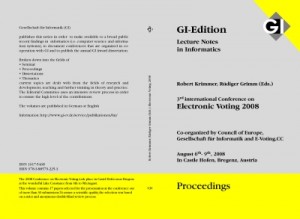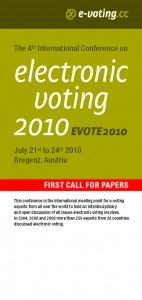Only articles in with the "eVoting" tag are displayed
To display all articles click
here.
6. August 2009 – 08:36 by E-Voting.CC
Our Conference Proceedings of the 3rd International Conference on Electronic Voting, which was held from  7th to 9th of August 2008 in Castle Hofen, are now online. Exactly one year after the opening session we are glad to publish them on the web. You can download the PDF here.
7th to 9th of August 2008 in Castle Hofen, are now online. Exactly one year after the opening session we are glad to publish them on the web. You can download the PDF here.
This year’s proceedings contain the seventeen papers selected for the presentation at the conference out of more than forty submissions. To assure scientific quality, the selection was based on a strict and anonymous review process. The papers cover the following subjects: e-voting experiences, social, legal, political, democratic and security issues of e-voting, as well as solutions on how to (re)design election workflows, and finally how to implement and observe electronic voting systems.
You can order the proceedings in print for EUR 19,70 (+shipping & handling) by sending an e-mail to office@e-voting.cc.
For citation and download purposes please use:
Krimmer, R., Grimm, R. (Eds.): Electronic Voting 2008, GI Lecture Notes in Informatics, P-131, Bonn, 2008.
Daniel Botz, E-Voting.CC
Posted in News | No Comments »
23. July 2009 – 15:19 by E-Voting.CC
The fourth International Conference on Electronic Voting is coming up. There’s still one year to  go, nevertheless our first call for papers folder is out now! Please click on the image to download the folder as a PDF.
go, nevertheless our first call for papers folder is out now! Please click on the image to download the folder as a PDF.
For the fourth time since 2004 our exclusive conference with hundred key experts and deciders from all five continents will be held from the 21th until the 24th of July 2010. The venue will be, as in previous years, the beautiful Castle Hofen, which is situated in Lochau in the vicinity of Bregenz and Lake Constance.
The conference will focus on all aspects of electronic voting, such as legal, technical, social, political questions as well as reports on implementations and practical experiences throughout Europe and the world. There will also be workshops on different topics held by designated experts in the field. The regular Conference Fee will be 300EUR (incl. VAT). The event is limited to 110 visitors only.
Social activities such as the legendary dinner event “Käsestraße” or a visit of Giuseppe Verdi’s opera “Aida” at the floating stage in Bregenz are the highlights after the work has been done. We will also host a Pep-Net meeting in the fore field of the conference.
The time line for submission of the papers is as follows:
Submission of the full paper: February, 12th 2010
Review deadline: March, 12th 2010
Notification of acceptance: April, 5th 2010
Receipt of the final paper: May, 14th 2010
If you are interested in submitting you paper or in attending the conference, send us an email with your inquiry to: 2010 [at] e-voting.cc.
by Daniel Botz - E-Voting.CC
Posted in 39, News, members | No Comments »
14. April 2009 – 09:53 by CTI
Democratic societies of today face the challenge of upgrading public dialogue and reinforcing citizens’ participation in decision making, thus passing from an e-government to an e-governance model. eVoting is an important aspect of this effort, while at the same time is one of the most controversial issues at a technological, political and social level. A basic precondition for the maturity and acceptance of eVoting systems is the establishment of trust for their users. Read the rest of this entry »
Posted in Uncategorized | No Comments »
14. November 2008 – 17:17 by Danish Technological Institute
Dear Colleagues,
Many of you may already know the European Journal of ePractice (EjeP), but do you know that the next special edition is devoted entirely to eParticipation!
The 6th issue of the Journal provides a good chance to write articles based on our work and experiences and provide an excellent opportunity to public, disseminate and most importantly to exchange experiences and ideas.
Launched in November 2007 the Journal belongs to the ePractice.eu community and is sponsored by the European Commission as part of its good practice exchange activity and is run by an independent Editorial Board.
The aim of the Journal is to reinforce the visibility of articles as well as that of professionals while strengthen the overall ePractice.eu activity. The Journal promotes the diffusion and exchange of good practice in eGovernment, eHealth and eInclusion and is available to all potential readers free of charge. The Journal currently has an audience of 50,000 professionals in Europe and beyond, and build on a community of some 14,000 members.
The deadline is 8 December, but I know that the editor for the eParticipation issue Jeremy Millard can be pursuaded to extent the deadline till the second half of December if asked nicely. Relevant links are provided below.
Call: https://www.epracticejournal.eu/info/11
Submission guidelines: https://www.epracticejournal.eu/guidelines
European Journal of ePractice: https://www.epracticejournal.eu/home
Morten Meyerhoff Nielsen
Danish Technological Insitute
Posted in News, good practice | No Comments »
11. November 2008 – 01:11 by E-Voting.CC
E-Voting.CC, the competence centre for electronic voting and participation in Vienna, has started the first European E-Voting competition last January. Our aim was to get international submissions of single persons or teams who programmed an Internet voting system which can be used for association elections.
The submitted systems had to comply with the following:
■ A fully operational voting system, accessible on the Internet has to be submitted.
■ The software’s source code must be completely revealed and accessible for further, licence-free development.
■ Documentation of the software and all processes is compulsory.
■ The fundamentals of general, equal, secret, free, direct and personal elections must be met and secured.
■ The system shall facilitate the clearing of elections of unincorporated associations.
■ WAI (Web Accessibility Initiative) conformity for barrier free internet access has to be ensured.
An international jury of five expert selected three of the eight submissions we’ve got to be presented at the Third International Conference on Electronic Voting, which has was held from the 6th to 9th of August 2008 in Bregenz, Austria - one of the locations of the new James Bond movie. The three competitors had to defend their systems in front of the jury, which scrutinized the systems thoroughly.
The lucky winner was a Greek team called “PNYKA” from the University of Patras. Their solution could score through sophisticated security measures and high usability. PNYKA was the largest team and their members had developed the system for an earlier research program, which was an advantage indeed.
Two subsidized awards were given to an Austrian (Daniel Ratzinger) and a German student (Gerold Grünauer).
Winning team: PNYKA
Country: Greece
Members: Yannis Stamatiou, Christos Manolopoulos, Dimitris Sofotassios, Giorgos Avramidis and Antonis Tatakis
Short system description: PNYKA is an internet based electronic voting system which was developed within the scope of a research program of the General Secretariat for Research and Technology of the Greek Ministry of Development.
Please find further details on the software here.
We hope, that our project created a tool with which associations can set up their elections and that the discussion on internet voting systems and electronic participation was nourished.
Daniel Botz (Project Assistant, E-Voting.CC)
Posted in Projects | No Comments »
5. September 2008 – 15:42 by CTI
eVoting lies in the heart of eParticipation initiatives as it is related to the citizen’s most fundamental right, the right to vote.
Although significant eVoting initiatives have taken place in several countries (e.g. national elections in Estonia, Switzerland, etc.), eVoting is far from being fully accepted. It is still a highly controversial issue in the minds of politicians and citizens, raising a lot of critique, while several incidents of misconduct (e.g. in USA or in UK) further harm citizens’ trust and increase wariness.
On the other hand, other critical eGovernment applications (such as tax payment applications or financial transactions) seem to be well established and accepted by the public, despite the fact that they also involve sensitive personal data and that they are supported by similar underlying technologies.
Further research on this diverse degree of acceptance of the two electronic services could provide valuable insight on the factors that affect eVoting acceptance and could reveal new approaches towards successful initiatives. This research would be multidisciplinary, involving areas of technology, political sciences, sociology, psychology, etc. Some thoughts are presented here as a starting point for further discussion.
eGovernment applications cover everyday needs of citizens, returning immediate and tangible benefits (time saving, ease of use). As a result, citizens are highly motivated to use them, even putting aside their potential reluctance. On the other hand, in the case of eVoting, the benefits are mostly for the government (cost saving) or the society in general (increased participation), thus only indirectly affecting the citizen.
What is more, eGovernment applications are longer established, more mature, and people are more familiar with them.
Cautiousness against voting (and hence eVoting) procedures is further increased when considering their global impact, affecting the society as a whole and not only individuals.
Another influential factor is that voting procedures occur less frequently and attract huge attention (by people, politicians, media). Cases of misconduct are also highly publicized. On the contrary, eGovernment transactions occur on a daily basis and are smaller-scale by nature.
After all, maybe in the minds of citizens, their vote is more critical and sensitive than financial data.
Bearing these considerations in mind, some approaches towards increasing eVoting acceptance could involve:
- Wide promotion and dissemination of the proven technological excellence of a system as well as the organizational procedure foreseen, in order to convince the public for the sound operation and running of the whole voting procedure.
- Emphasis on specific aspects of an e-service that seem to affect the users’ trust, for example clear presentation of privacy protection policy or possibility of direct contact with person responsible.
- Awareness raising, with a two-fold aim:
- Familiarization with the concepts of participation in common matters.
- Familiarization with existing tools and technologies but also existing risks and ways of protection. A first step could involve familiarization with the plethora of eVoting or e-participation tools that are available online.
To conclude, one of the major challenges of successful eVoting initiatives, apart from working on technological solutions to meet voting requirements, is to increase public trust and acceptance. To this end, a gradual and multi-faceted approach should be followed.
by Anastasia Panagiotaki, eGov Sector, Computer Technology Institute
Posted in Uncategorized | 4 Comments »
 7th to 9th of August 2008 in Castle Hofen, are now online. Exactly one year after the opening session we are glad to publish them on the web. You can download the PDF here.
7th to 9th of August 2008 in Castle Hofen, are now online. Exactly one year after the opening session we are glad to publish them on the web. You can download the PDF here.








